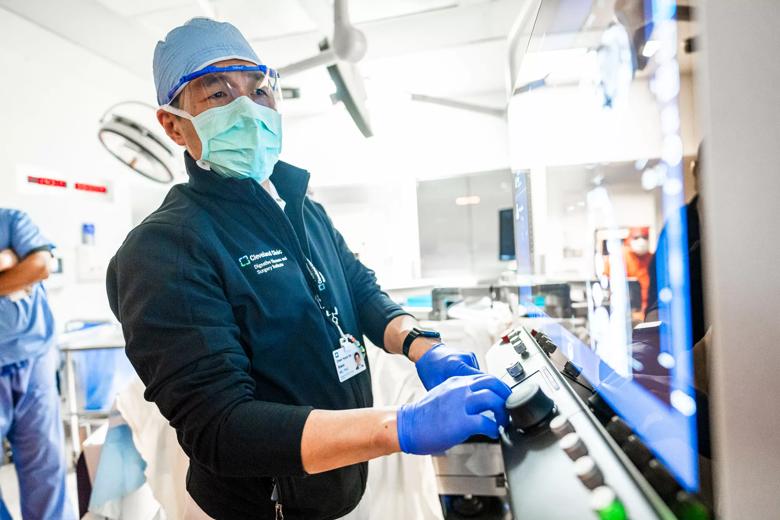Content is property of Cleveland Clinic and for news media use only.

Cleveland Clinic has started using a recently FDA-approved ultrasound device to treat liver tumors. The non-invasive technology, called histotripsy, uses brief high-intensity ultrasound pulses that disrupt and kill the targeted tumor cells.
Choon Hyuck David Kwon, M.D., Ph.D., director of Minimally Invasive Liver Surgery at Cleveland Clinic’s Digestive Disease Institute, led a team of surgeons and nurses during the first procedure that liquified a small tumor on the left side of the patient’s liver. Following the procedure in December 2023, the patient recovered well. The patient was being treated for liver metastases from colorectal cancer.
To deliver the treatment, Dr. Kwon used an ultrasound machine connected to a mobile robotic arm, which was positioned above the patient’s abdomen to precisely target the liver tumor. The microsecond ultrasound pulses created microbubbles in the targeted tumor, which disrupted and killed the diseased cells.
“This treatment is noninvasive, which provides the patient with an easy recovery following the procedure,” said Dr. Kwon. “In addition, studies have shown that, in some cases, a histotripsy treatment may stimulate the body’s immune system to attack cancer cells.”
Researchers are looking into a phenomenon – known as abscopal effect – that has been observed in patients with cancer following radiation therapy and ablation. Following radiation therapy treatment, researchers have noticed, in some cases, an anti-tumor response that causes untreated tumors to shrink. Histotripsy may also produce an abscopal effect in some cases.

Image content: This image is available to view online.
View image online (https://assets.clevelandclinic.org/transform/d1388372-bec7-4032-a916-b2f1b77d02e5/DDI_Auger_4472661_New-Technology-Surgery-Dr-Kwon_12-20-23_MLC)
Choon Hyuck David Kwon, M.D., Ph.D., performs histotripsy on liver tumors.
Since the first case, Dr. Kwon and his colleagues – including Federico Aucejo, M.D., and Jaekeun Kim, M.D.– have successfully used the ultrasound technology to treat more patients with liver tumors. On average, the procedure lasts up to an hour.
“More research is needed to continue to study the benefits of histotripsy, including the occurrence and frequency of the abscopal effect,” said Dr. Kwon. “I see this noninvasive treatment as a complement to our current therapies for liver tumors, including surgery and chemotherapy.”
Currently, histotripsy is only FDA-approved for tumors in the liver.
For more information about treatment options for liver tumors, please visit Cleveland Clinic’s Liver Cancer Program.
Cleveland Clinic is a nonprofit multispecialty academic medical center that integrates clinical and hospital care with research and education. Located in Cleveland, Ohio, it was founded in 1921 by four renowned physicians with a vision of providing outstanding patient care based upon the principles of cooperation, compassion and innovation. Cleveland Clinic has pioneered many medical breakthroughs, including coronary artery bypass surgery and the first face transplant in the United States. Cleveland Clinic is consistently recognized in the U.S. and throughout the world for its expertise and care. Among Cleveland Clinic’s 82,600 employees worldwide are more than 5,786 salaried physicians and researchers, and 20,700 registered nurses and advanced practice providers, representing 140 medical specialties and subspecialties. Cleveland Clinic is a 6,728-bed health system that includes a 173-acre main campus near downtown Cleveland, 23 hospitals, 280 outpatient facilities, including locations in northeast Ohio; Florida; Las Vegas, Nevada; Toronto, Canada; Abu Dhabi, UAE; and London, England. In 2024, there were 15.7 million outpatient encounters, 333,000 hospital admissions and observations, and 320,000 surgeries and procedures throughout Cleveland Clinic’s health system. Patients came for treatment from every state and 112 countries. Visit us at clevelandclinic.org. Follow us at x.com/CleClinicNews. News and resources are available at newsroom.clevelandclinic.org.
Editor’s Note: Cleveland Clinic News Service is available to provide broadcast-quality interviews and B-roll upon request.